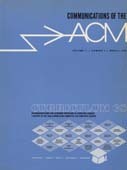In this letter, Dijkstra talks about readability and maintainability in a time where those topics were rarely talked about (1968). This letter was one of the main causes why modern programmers don’t have to trouble themselves with goto statements. Older languages like Java and C# still have a (discouraged) goto statement, because they (mindlessly) copied it from C, which (mindlessly) copied it from Assembly, but more modern languages like Swift and Kotlin don’t even have a goto statement anymore.



In C# at least,
gotocan take you between case labels in a switch statement (rather than using fallthrough), which I don’t view as being nearly as bad. For example, you can dogoto case 1orgoto defaultto jump to another case.The only other use of
gotoI find remotely tolerable is when paired with a labelled loop statement (like putting a label right before aforloop), but honestly Rust handles that far better with labelled loops (and labelled block expressions).I’ve programmed C# for nearly 15 years, and have used
gototwice . Once to simplify an early break from a nested loop, essentially a nestedcontinue. The second was to refactor a giant switch statement in a parser, essentially removing convolutedwhileloops, and just did agotothe start.It’s one of those things that almost should never be used, but the times it’s been needed, it removed a lot of silliness.